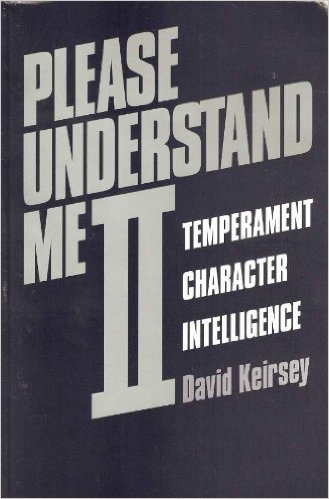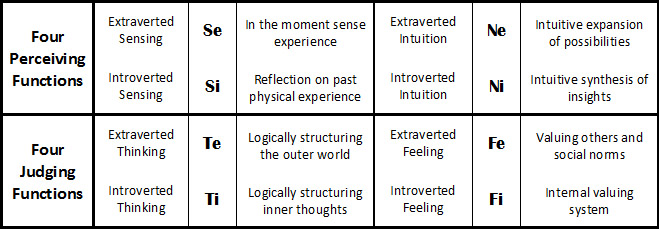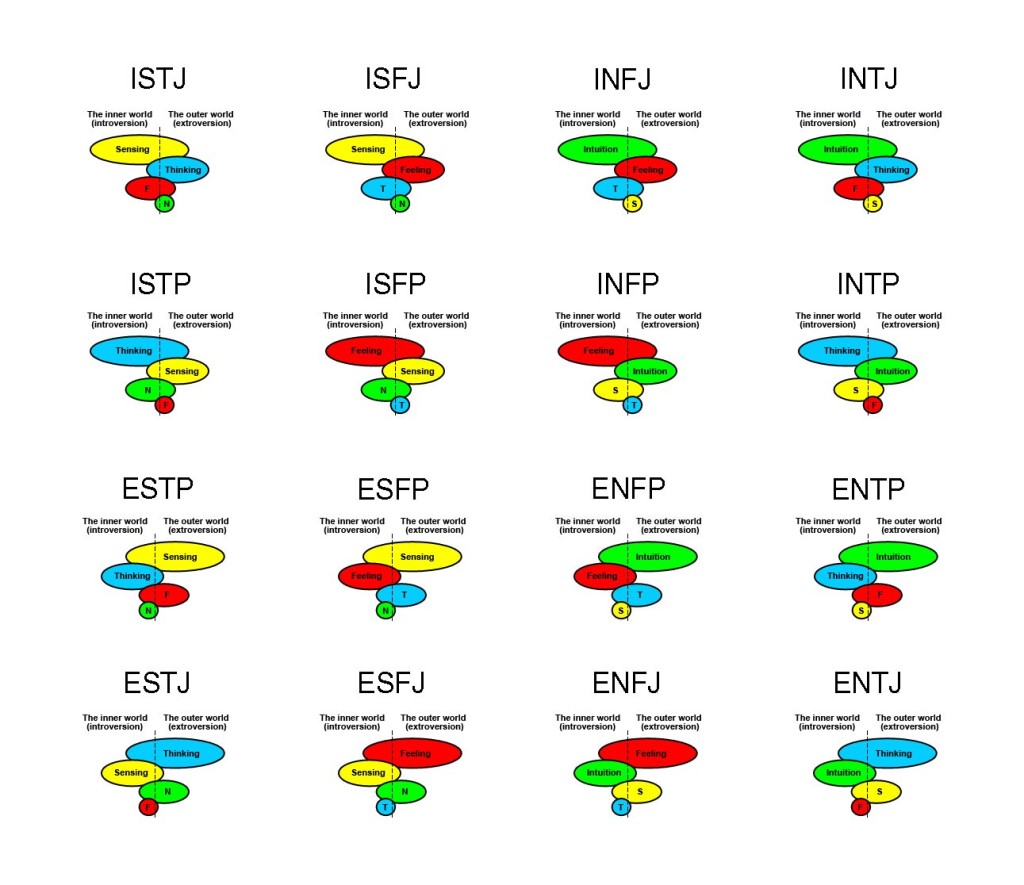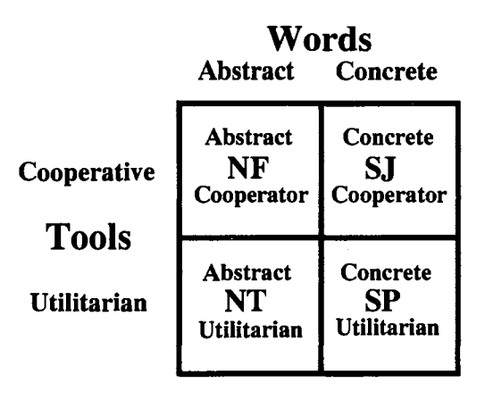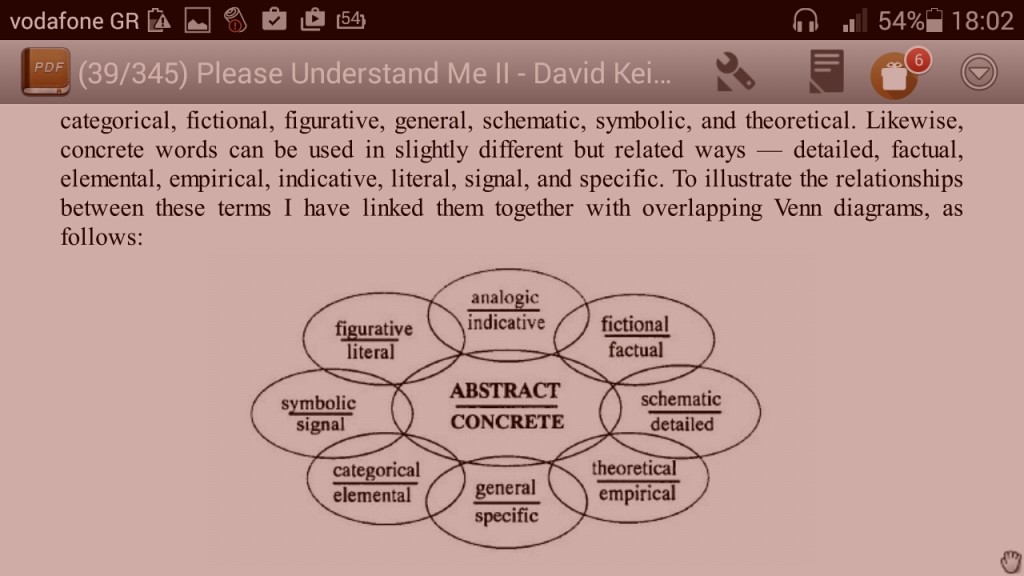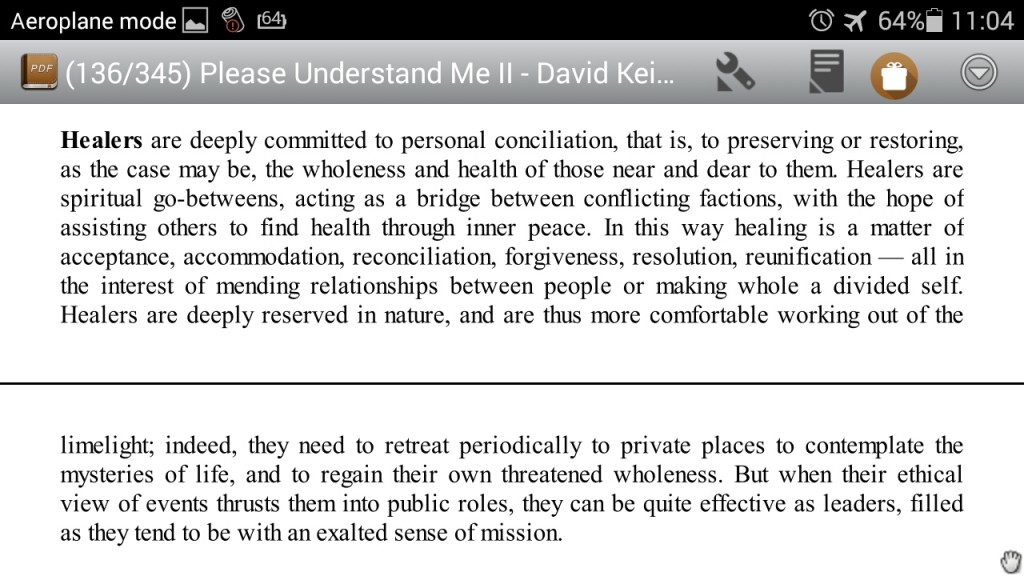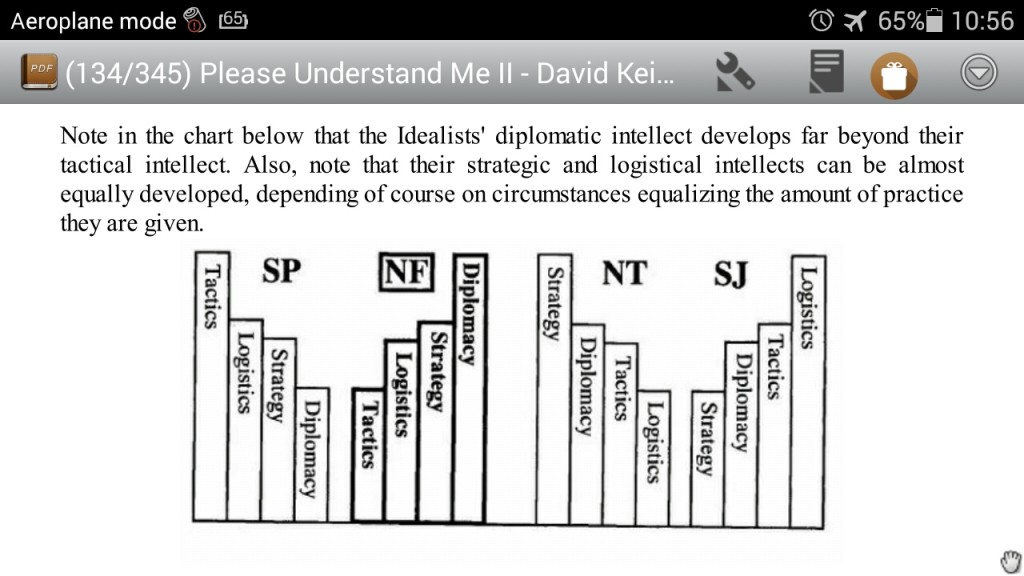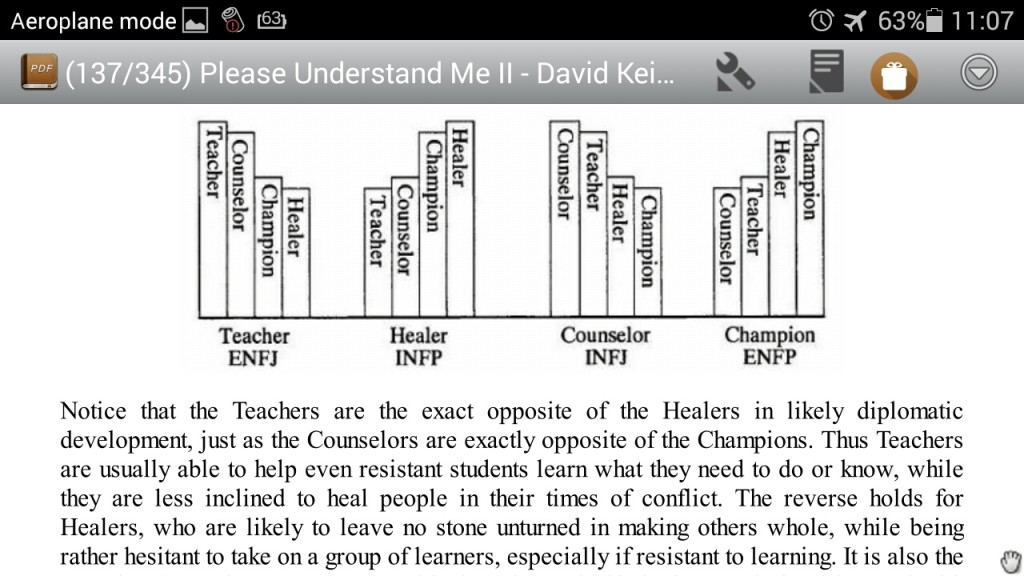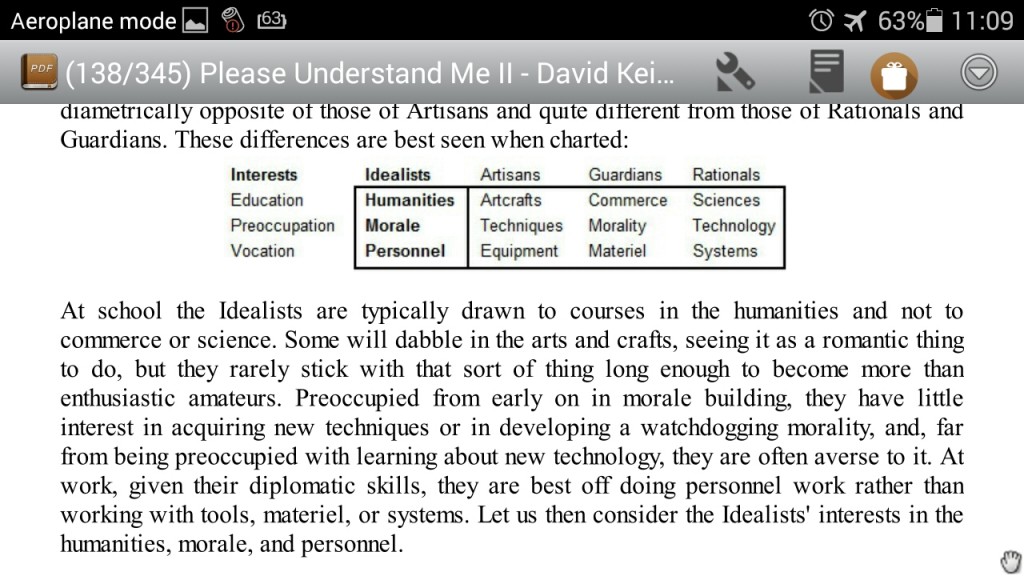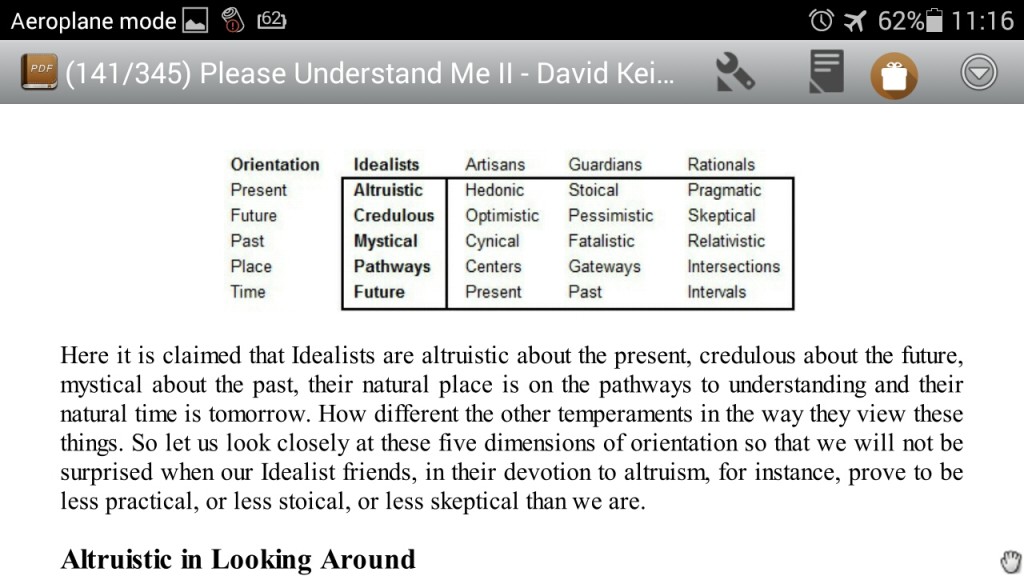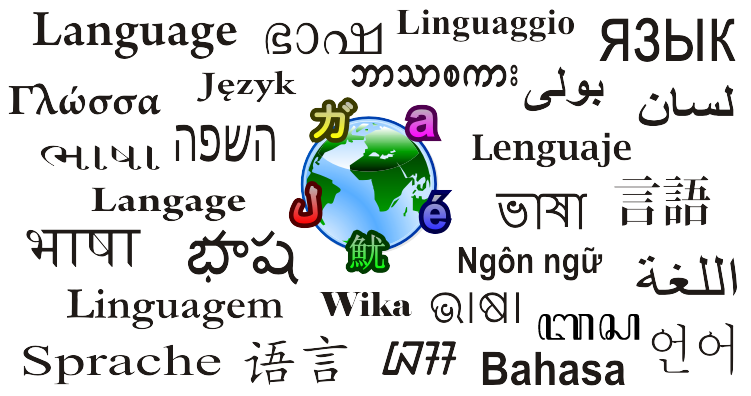 Please Understand Me II: Temperament, Character, Intelligence by David Keirsey
Please Understand Me II: Temperament, Character, Intelligence by David Keirsey
My rating: 4 of 5 stars
Some books I only review because of the sort of benign OCD I’ve developed that compels me to write something about every book I read; with others I can’t stop myself from going all-out, even if I didn’t enjoy reading them enough to award them 5 stars to begin with. With psychology and typology (personality type) books, the latter is almost always the case. Perhaps to a fault, I might add, for the wall of text lying beneath is arguably not the optimal way of transmitting this, let’s face it, difficult information. Still, I’m a reader rather than a video watcher… but I’m not the only one. ♪
As a review this probably won’t work, but that said: what if I finally accept that it’s not me writing a review here, but taking the opportunity to process, share and, in typical Hallographic style, lovingly re-transmit the fascinating information, empathy and communication skills this book filled my mind and attention with, at least for a time?
Some books might not be for everyone or even five-star worthy as far as reading pleasure is concerned, but they do contain valuable ideas absolutely worth spreading, writing and talking about.
Watch me embracing the fact that this is not going to be a review.
…
I read Please Understand Me II on my Android on .pdf. It is David Keirsey’s definitive 1998 update to his original 1984 Please Understand Me. He himself was (he died in 2013) the personality psychologist who created the Keirsey Temperament Sorter (link to the test as it appears in the book, it’s worth the manual effort to complete) and the Four Temperaments typing system. It shares its name with Hippocrates’ and Galen’s original four temperaments theory, which has for millennia sorted people’s personalities into choleric, phlegmatic, melancholic and sanguine.
This archetype has survived to this day in its original form and has thus proved rather durable, along with various other ancient and medieval derivatives, albeit few people consider them as valid typological systems anymore (I’m of two minds about being a Nymph, according to Paracelsus). From Wikipedia’s article on the Keirsey Temperament Sorter:
| Date | Author | Artisan temperament | Guardian temperament | Idealist temperament | Rational temperament |
| c. 590 BC | Ezekiel‘s four living creatures | lion (bold) | ox (sturdy) | man (independent) | eagle (far-seeing) |
| c. 400 BC | Hippocrates’ four humours | cheerful (blood) | somber (black bile) | enthusiastic (yellow bile) | calm (phlegm) |
| c. 340 BC | Plato’s four characters | artistic (iconic) | sensible (pistic) | intuitive (noetic) | reasoning (dianoetic) |
| c. 325 BC | Aristotle’s four sources of happiness | sensual (hedone) | material (propraietari) | ethical (ethikos) | logical (dialogike) |
| c. 185 AD | Irenaeus’ four temperaments | spontaneous | historical | spiritual | scholarly |
| c. 190 | Galen’s four temperaments | sanguine | melancholic | choleric | phlegmatic |
| c. 1550 | Paracelsus’ four totem spirits | changeable salamanders | industrious gnomes | inspired nymphs | curious sylphs |
| c. 1905 | Adickes’ four world views | innovative | traditional | doctrinaire | skeptical |
| c. 1912 | Dreikurs’/Adler’s four mistaken goals | retaliation | service | recognition | power |
| c. 1914 | Spränger’s four* value attitudes | artistic | economic | religious | theoretic |
| c. 1920 | Kretschmer’s four character styles | manic (hypomanic) | depressive | oversensitive (hyperesthetic) | insensitive (anesthetic) |
| c. 1947 | Fromm’s four orientations | exploitative | hoarding | receptive | marketing |
| c. 1958 | Myers’ Jungian types | SP (sensing perceiving) | SJ (sensing judging) | NF (intuitive feeling) | NT (intuitive thinking) |
| c. 1978 | Keirsey/Bates four temperaments (old) | Dionysian (artful) | Epimethean (dutiful) | Apollonian (soulful) | Promethean (technological) |
| c. 1988 | Keirsey’s four temperaments | Artisan | Guardian | Idealist | Rational |
| c. 2004 | Gordon-Bull Nexus Model[5] | Gamma | Beta | Delta | Alpha |
Keirsey’s Artisan, Guardian, Idealist and Rational types have come a long way indeed since the time Hippocrates classified people by their over-secretion or lack of certain human bodily fluids: the system was developed upon many decades of research, observation, counseling and comparing the behaviour of his clients. It is not the only typology system to have been built on observation and the scientific method, but it differs from others in the fine points.
To be exact, whereas the Enneagram on the one hand—to name my favourite such system—separates people into nine categories based on their preconceived deficiencies of character, sources of insecurity and ambitions, and the Myers-Briggs Type Indicator on the other, probably the most well-known and used such system around the world, sorts people into sixteen categories by the order of preference of their eight types of Jungian cognitive functions, it is a person’s outward behaviour that goes to determine their Keirsey temperament.
Because Keirsey worked with Myers and Briggs and his system of typology is understandably an extension or “expansion” to theirs, his four types are basically the sixteen MBTI types divided by four. He noticed similar behavioural patterns between certain types and identified the connectors as the common letters in the types’ names, e.g. the INFP and the ENFJ are both intuitive and feeling types, which makes them both Idealists, while Guardians are SJs, meaning ESTJs, ISFJs and so on.
If you’re at all familiar with Jungian cognitive functions, you might know that the four core cognitive functions (thinking, feeling, intuiting and sensing), farther multiplied by two by being either extraverted or introverted in nature, are fundamentally separated into the perceptive ones, the ones we use to take in information about the external world (sensing/intuiting) and the judging ones, the ones we use to make decisions (thinking/feeling). The two letters comprising the name of the Keirsey temperament denote the combination of an individual’s preference in both perception and judgment.
Thus, for instance, NFs primarily take in information from the external world by using their iNtuition, and they mainly take decisions using their Feelings. NTs, respectively, also take in information about the world using their iNtuition. However, they do not primarily use their feelings to make decisions as the NFs do, but rather use their Thinking function.
It would follow that the four Keirsey types should be NF, NT, SF and ST, and indeed, before Keirsey came along, Myers and Briggs used to separate the sixteen types as so. Nevertheless, Keirsey did come along and observed that SPs and SJs bore far more behavioural similarities to each other than STs and SPs did. He incorporated his findings to his four temperaments theory and thus drew the blueprint for what I believe to be the MBTI 2.0.
Actually, maybe not an MBTI 2.0, because by itself the MBTI is still quite usable. In case however one wishes to combine different systems of typology in order to make more complete or nuanced profiles for people— combining the Enneagram with the MBTI so as to have an overview of both a person’s ambitions, fears and behavioural patterns, for example—i.e. for the purpose of synergy, the Keirsey Type Sorter works far better than the MBTI and in any case it can be a very effective, hard and fast way of identifying a person’s type; you can usually tell fairly easily and intuitively which temperament a person is, whereas with the MBTI and its sixteen whole different types it can be difficult and in any case requires a lot of experience.
The benefits of typing people themselves and why one would want to do it I’ll leave for another time, but I’m sure you can fill in the gaps depending on your own needs for better communication.
What I still haven’t got into at all is how this whole Keirsey thing works.
As mentioned earlier, Keirsey’s theory is only indirectly focused on cognitive functions. Rather, he speculated that, on one hand, people’s behaviour can be separated into two categories according to their use of language and expression: either specific/concrete or generalising/abstract. This often translates into “detail-oriented/pragmatic/moving from the specific towards the whole” and “big-picture/theoretical/moving from the whole towards the specific”, respectively.
This screenshot might help with developing the concept of abstract vs. concrete speech in your mind (pardon the peculiar white balance; I was reading in bed at that moment and had Twilight activated):
On the other hand, people use different “tools” for achieving their goals, which Keirsey identified as either utilitarian/pragmatic or cooperative. From Wikipedia’s article on the Keirsey Temperament Sorter:
People who are cooperative pay more attention to other people’s opinions and are more concerned with doing the right thing. People who are pragmatic (utilitarian) pay more attention to their own thoughts or feelings and are more concerned with doing what works. There is no comparable idea of Myers or Jung that corresponds to this dichotomy, so this is a significant difference between Keirsey’s work and that of Myers and Jung.
The pragmatic temperaments are Rationals (pragmatic and abstract) and Artisans (pragmatic and concrete). The cooperative temperaments are Idealists (cooperative and abstract), and Guardians (cooperative and concrete). Neither Myers nor Jung included the concept of temperament in their work. Jung’s psychological functions are hard to relate to Keirsey’s concepts.
In Please Understand Me II, Keirsey goes through not only the fundamentals of his theory and the characteristics of each type, he also has separate sections and detailed overviews for each subtype (the following is for INFPs/Healers);
breakdowns of each type’s strong and weak skills:
further breakdown for best-suited job in “diplomacy”-oriented fields, the NFs’ specialty (which include teaching, counseling, championing, “healing”, doing reconciliatory, cross-disciplinary work, e.g. between science and metaphysics, to name a pertinent example that fascinates me personally, etc):
A little clarification is in order here: NFs are natural diplomats and horrible tacticians — that could be why I love the big map in Total War games, enjoy Diplomacy (the game) and Dixit, tend to royally suck at the tactical battles in Total War and am absolute garbage in StarCraft II. SPs, on the other hand, are the complete opposite, and you can tell how SPs are poor at diplomacy, since they’re usually the types who most refuse to seek common ground or look at things from a different perspective, but are very good at looking at things practically due to their concrete/utilitarian duality. Conversely, NTs are great strategists and poor logisticians, while SJs are the opposite.
The following analysis goes on to portray common interests for each type (notice how Idealists “will be drawn to the humanities and might dabble in the arts and crafts but rarely stick with that sort of thing long enough to become more than enthusiastic amateurs“—professional artists are, more often than not, Artisans, due to their sensory, present-oriented nature):
or the way in which the different types have completely different orientations connected to time, the past, present and future, and which of these they favor. Note that Rationals understand time as intervals: “for them, time exists not as a continuous line, but as an interval, a segment confined to and defined as an event. Only events possess time, all else is timeless.”
What distinguishes Please Understand Me II as an actually usable book is that, on top of everything else, it has detailed, separate sections on temperaments and parenting, leading people and romantic relationships. The latter I found particularly interesting: Keirsey writes that one of the major reasons many romantic relationships tend to fail is that partners make Pygmalion projects of one another, that is, we consciously or subconsciously try to make partners into mirror images of ourselves. If we first understand, then accept our partner’s temperament, Keirsey suggests, the relationship could only benefit from it and remain stable.
Furthermore, compatibility between temperaments vary: apparently Idealists and Rationals are natural fits, because we can understand each other’s abstract way of communication and perception intuitively—deep conversations, big ideas, little appreciation for small-talk, that sort of thing. However, due to both types being rarer than concrete Guardians and Artisans (for reasons unknown, concrete communicators are roughly double in numbers than abstract communicators—we’re precious little flowers, we abstracts), those types usually have a hard time finding well-suited mates.
I, for one, have been told that if some of my male Rational friends were female I’d fall for them hard, so there’s that…
Moving on, the chapter on temperament and parenting I found interesting as well, i.e. how parents value different things in raising their children depending on their own temperaments. For example, an Artisan parent will want their child to possess many different useful skills and will try one way or another to transmit them to it (long hours at language schools and martial arts classes?); a Guardian parent will value security and stability above all else (urging their child to settle), whereas a Rational parent will try to inspire in their child a sense independence from other people and external influence.
Where this often goes wrong is that parents not only make Pygmalion projects our of their partners, they do so for their children as well, and so typically fail to take their child’s own temperament into account when it comes to its upbringing and relevant important decisions. This can and will alienate the child and make it feel unloved or that it has to constantly prove itself, among a slew of other avoidable psychological complications and complexes.
Interestingly, as far as we can observe and Keirsey claimed, temperament is not hereditary: it is determined at birth, does not follow parental patterns and is permanent for life. It is sort of arbitrary, selected at random at “character creation”, you could say. I find that little fact absolutely fascinating: that a big part of who we are is “predetermined”, despite the term being taboo in contemporary psychology and behavioural science.
Paraphrasing Keirsey, temperament is like a person’s hardware—just there, native, unchangeable, with radical, often virtually unbridgeable incompatibilities with other protocols—whereas character is software or an operating system that runs on that hardware. “[…] Thus temperament is the inborn form of human nature; character, the emergent form, which develops through the interaction of temperament and environment.”
What a parent can do to make sure that their child will thrive and not develop insecurities and low self-esteem because it feels as if it cannot fulfill its parents expectations, is identify their child’s temperament early on—it’s usually quite obvious from the 3rd or 4th year—and move with the temperament’s forces, not away from them or even against them: encourage their child to be itself, not what the parent would like it to be.
I can easily imagine a Rational parent, for example, being hard on their Artisan child for not being logical or even clever enough, or an Idealist parent trying to make their Guardian child more “alternative”, when the child just won’t stray from the mainstream. What the parents could be failing to see is that their children might have green fingers or a well-developed sense of honour and duty, respectively. Oh, the woes of an Idealist parent when their Guardian child wants to uphold the law for a living!
I’ve gone on long enough already. I will conclude this little here review/essay/introduction to Keirsey by saying that if psychology, communication and human relationships interest you at all, Please Understand Me II and Keirsey’s work in general is a must-read. Together with the Enneagram, typology can be a very powerful tool for understanding people, living and working better with them and, as important as ever, understanding and identifying one’s own worth and learning to go with, not against, one’s own temperament—one’s own nature.
PS: At some point while going through this book, I realised that my room-mates and colleagues in Sofia City Library and I were all different temperaments. An Idealist, a Rational, a Guardian and an Artisan all under the same roof! My memories of Zanda, Vicente and Maria and living together with them for nine months have been useful for imagining each temperament’s traits more concretely. Thanks guys!


